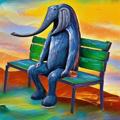Sam reviewed Ecotopia by Ernest Callenbach
Enjoyable, but with a lot of whitewashing
3 stars
Overall I enjoyed Callenbach's visions of a hopeful future. A few things felt out of place to me though:
The first was the "war games" which just didn't quite fit with the rest of the society, in my mind. It's quite possible I'm just missing something, but I couldn't understand why they were included or what their place in the functioning of the society was supposed to be (as a vent for toxic masculinity to express itself so that it doesn't permeate into every day life, maybe? It seems like this could be done with less injury). They're also part of broader problematic appropriation of indigenous culture by the almost exclusively white cast (more on that in a bit) in the book in a way that feels a bit tropey, which I didn't love.
Similarly, there's a very out-of-place feeling chapter in the middle where he randomly says (paraphrasing): "and …
Overall I enjoyed Callenbach's visions of a hopeful future. A few things felt out of place to me though:
The first was the "war games" which just didn't quite fit with the rest of the society, in my mind. It's quite possible I'm just missing something, but I couldn't understand why they were included or what their place in the functioning of the society was supposed to be (as a vent for toxic masculinity to express itself so that it doesn't permeate into every day life, maybe? It seems like this could be done with less injury). They're also part of broader problematic appropriation of indigenous culture by the almost exclusively white cast (more on that in a bit) in the book in a way that feels a bit tropey, which I didn't love.
Similarly, there's a very out-of-place feeling chapter in the middle where he randomly says (paraphrasing): "and of course integration doesn't work, so the black people have their own cities". Whoa, where did that come from? He tries to launder the idea into sounding virtuous by saying (again, paraphrasing) "but they were the ones who chose it for themselves and their cities are also doing well, it's no longer 'separate but equal', there really is a measure of economic justice", and, oddly, by having the (white) American be slightly disappointed by this situation, but again I just couldn't figure out why in the world that would be in there or what purpose it was supposed to have in the society. It really felt like he was trying to justify a personal view that he knew was wrong.
I suppose none of this is surprising from a white man in 1975, it's just so shocking how little it fits with the society he envisions in the rest of the book. Those 10 or so pages just really knocked it down a few notches for me. A brief search didn't turn up him ever having been asked about it, but if he was or if a future book addresses these problems further I'd love to know.


